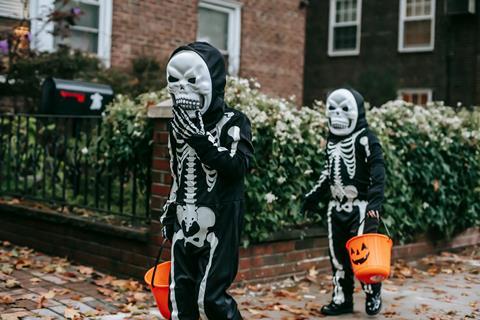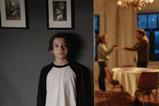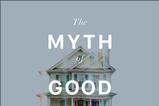Kate Orson sees very real dangers in Halloween and urges Christian families not to participate

For an alternative view see here.
On the surface Halloween looks light and fun. Children dress up in cute costumes that are spooky in a cartoonish way. They collect sweets, play games, and enjoy each other’s company. Is it really that bad to join in the fun?
Halloween has dark origins. It has its roots in the Celtic festival of Samhain, which marks the end of summer, and the harvest season. Samhain was the druid god of death, and the Celts believed that on the 31st October the boundary between the living and the dead blurred and spirits could return to the earth. The origin of dressing up in costumes was because it was thought that if people dressed as ghosts and demons the spirits might mistake them for one of their own and would not harm them. During the festival animals and even humans were sacrificed to appease Samhain.
One of the problems I see with the festival is how it turns something God hates into a source of fun and laughter
In A.D. 1000, the church made November 1 All Souls’ Day, a day to honour the dead and so the evening before became All Hallow’s evening, abbreviated to ’Hallowe’en’. Despite this apparent ‘Christianisation’ of the holiday, I still think Christians should avoid celebrating it.
For those involved in witchcraft and Satanism it is one of the most important days of the year, because they believe the veil is thin between the physical and the spiritual world it is considered to be the most powerful time to perform spells. witches and Satanists take the day seriously, so I think we should too.
One of the problems I see with the festival is how it turns something God hates into a source of fun and laughter. For example, in Deuteronomy 18:10-13, we are told that witchcraft is an abomination to the Lord.
I think there’s a danger in fictionalising darkness and evil. It makes it seem pretend and made-up
‘Let no one be found among you who sacrifices their son or daughter in the fire, who practices divination or sorcery, interprets omens, engages in witchcraft, or casts spells, or who is a medium or spiritist or who consults the dead. Anyone who does these things is detestable to the LORD; because of these same detestable practices the LORD your God will drive out those nations before you.’
Halloween glorifies death, gore and witchcraft. It’s a night where children might playfully ‘cast spells’ on others or laugh at gruesome spiders and snakes or bloody costumes. The darkness becomes fun. I think there’s a danger in fictionalising darkness and evil. It makes it seem pretend and made-up, like something out of a Harry Potter book.
Witchcraft is becoming more and more mainstream, but in a quieter, more sneaky way
There are a number of testimonies of people whose childhood fascination with witchcraft and Harry Potter etc. graduated into practising real Wiccan witchcraft. It can be very exciting to discover that the supernatural realm is actually real. Witchcraft can be very tempting because it gives people personal power. It’s Satan’s lie from the garden of Eden, ‘you shall be like God.’
The Bible says we should train up a child in the way they should go, and I think part of this is not taking the risk of the enemy lightly. In Christian culture there is a lot of focus on the threat of the ‘woke agenda’ to our children. Yet Satan doesn’t always make it so obvious.
Witchcraft is becoming more and more mainstream, but in a quieter, more sneaky way. For example, the practise of ‘manifesting’ - using words and visualisation to get what you want via spiritual means is becoming much more common - in 2024, ‘manifest’ was the word of the year.
With access to the internet, as children get older, it’s all too easy to stumble upon a video or link that can open up the world of real witchcraft
With access to the internet, as children get older, it’s all too easy to stumble upon a video or link that can open up the world of real witchcraft, therefore I don’t think we should encourage anything that presents Halloween in a positive light.
That being said, God has not given us a spirit of fear, and so I think we must walk a careful line between being complacent and legalistic about Halloween.
For example, I did not become a Christian until my daughter was 10 years old. If I had been a believer when she was young, I would never have introduced the concept in the first place. While we don’t celebrate at home or go trick or treating, I have let her go pumpkin carving at a friend’s house, while also explaining my thoughts on Halloween.
Read more:
10 ways Christian parents can provide an alternative Halloween for children with additional needs
Navigating Halloween with kids through chocolate, conversation and Jesus
How Christian families can help shine a light this Halloween
With younger children, it’s relatively easy to deal with Halloween, just ignore the festival entirely. With older children, it can seem more complicated. I’m conscious of the fact that too much control and restriction could lead to rebellion. But also, as parents, sometimes we need to set limits even if our child is convinced we are spoiling all the fun. I think we need to consider things prayerfully and carefully with the guidance of the Holy Spirit.
Ultimately however we approach Halloween I think it is a fantastic opportunity to open up conversations at home with our families or out in the wider community about how Jesus defeated the darkness, so now there is really nothing to fear.
For an alternative view see here.


































